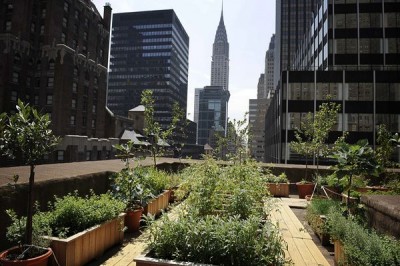Is there such a thing as urban homesteading? Absolutely, and in the next few moments I will provide you with useful advice if you live in the city or suburbs.
To begin with, let’s define urban homesteading, shall we?
To put it bluntly, urban homesteading means self-reliance/living off the grid as much as humanly possible for city dwellers.
The general idea behind urban homesteading is that you don’t have to own a property or a piece of land “in the country” (as in a rural area) to benefit and take pride from the fruits of your own labor.
An increasingly growing number of people who live in the suburbs and even in the cities are slowly learning this fact: You can develop a self-sufficient lifestyle without being forced to relocate, i.e., to leave your city home.
Yes, urban homesteading can be pretty tough sometimes, because you’re surrounded by the city’s cement jungle instead of acres and acres of farmland, but the good news is that you can still enjoy something relatively close to the “rural life” of our forefathers.
If you have a love for all things that grow from God’s green earth, keep reading. What I have to offer are some smart tips and tricks for turning your urban space into a self-sustaining oasis, for a feasible and live-free-way-of-life in terms of food supply.
Homesteading In The City? Try Microgreens!
So, here it goes:
1. Learn how to grow your own food indoors (lettuce, tomatoes, potatoes, squashes). The best way to learn this skill is to follow the basics of container gardening. Indeed, you don’t need an outdoor patch of land to grow veggies and things of that sort; for example, if you live in an apartment, you can use various containers filled with dirt instead, and grow produce even in tight spaces (like a balcony).
2. Learn how to save food for later use. I mean, you can’t eat a whole crop of tomatoes at once and, that’s why you must learn how to can/freeze dry/dehydrate your veggies and store them long-term. Learning these skills will also help you with lowering your grocery bills significantly. These skills are way easier to master than most people think.
3. Build a complete micro-farm. Just like these guys (below) managed to do. Using Google Maps for example, you can spot vacant plots of land in your home city, contact the owner, rent it and start farming.
4. Earn some cash. If you’re a successful urban homesteader and you’re confronted with a surplus of food, you can make an extra honest buck by selling it to food pantries or at local markets. The organic food business is booming and that’s great news if you’re a seller, right?
5. Learn how to compost your kitchen food scraps. The technique is called backyard composting and you can use a couple of garbage bins for that and add some composting worms into the mix.
6. Become a beekeeper. Yes, it’s possible, folks. A couple of Brooklyn urban homesteaders did it, and here’s the proof:
7. Rejuvenate old patches of urban/suburban land. Many of them are contaminated (with pesticides, for example). Put them to good use again using organic soil amendments.
8. Join an organic food co-op. You’ll be able to get more food for less money. Also, a food co-op an awesome way to start learning about the self-sovereign movement that’s growing fast in the United States.
9. Launch a community garden. Community gardens are great for bringing urban homesteaders closer together, for breaking social isolation which is a real problem in our day and age, and also for putting people in direct contact with the source of their daily food. Encouraging community interaction and achieving food security is great in my book, so go try it for yourself and see where it takes you.
What advice would you add to this list? Share your tips in the dedicated section below:
Learn Dozens Of All-Natural Gardening Secrets. Read More Here.
 Off The Grid News Better Ideas For Off The Grid Living
Off The Grid News Better Ideas For Off The Grid Living




